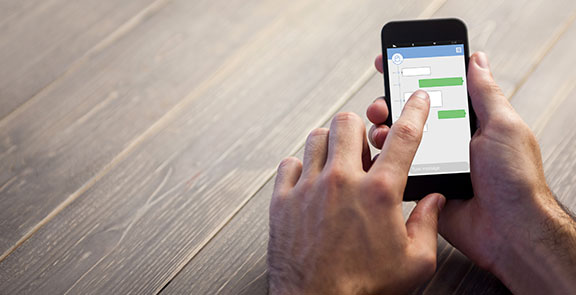Appointment Messaging Should Include Texting

Appointment related messages includes booking confirmations, appointment reminders and appointment cancellations (by either the therapist or the patient).
Perhaps the biggest change business has experienced in the past decade is the mainstream adoption of mobile phone usage. Businesses across Canada have had to change the way they reach their audience by adapting to mobile-friendly alternatives. Since consumers now use their mobile phones at work, at home and on-the-go, RMT’s are also adopting mobile communications in the form of SMS (short message service/text messaging) in addition to emails to reach their patients, primarily in appointment related messaging.
Non-attendance for appointments (patient no-shows) with RMT’s is a costly matter. Due to the length of RMT’s treatments, RMT’s generally do not have the option of “over-booking” their schedules to account for no-shows. Adoption of automated appointment reminder technologies have proven to significantly improve attendance rates for RMTs.
Most practice management systems include online booking and automated appointment related messages via both email and/or SMS (text) messaging. The question is which messaging technique should you use in your practice? The answer very likely is that you should use both. It is important to offer the choices to your patients and to manage their appointment communication permissions and preferences. After all, if your patient has not given you permission to use their email address and/or cell phone number to communicate with them, you should not be using them to send appointment related messages.
So how should you implement and manage electronic appointment messages for your patients?
Fortunately, modern practice management systems make this an easy task. Your patient database likely will provide you with the ability to collect and store patient contact information including their email address, and mobile phone number. The system will also likely support both email and text appointment confirmation, reminder and cancellation messaging. All you have to do now is ask your patients how they wish to receive their appointment messages and perhaps suggest that you can provide both email and SMS. It is usual that patients will ask you to use both. Then all you have to do is configure their preferences and the system will deliver the messages accordingly until their preferences change. It is also worth noting that some patients may prefer that they receive a telephone call reminder as this is still a viable option.
Let’s look at the two main communication techniques and compare their relative effectiveness. Here are a few general statistics and details related to the two technologies.
- While both are reliable services, neither SMS nor email are guaranteed delivery services. It is estimated that 1-5 percent of messages are simply lost within the delivery system.
- Email message length is basically unlimited while SMS is limited to 160 characters.
- Email is the most used business communication tool.
- Texting is the most used (non-social media related) data service on the planet.
- Approximately 8 trillion SMS messages are sent every year. (Keep in mind the world population is approximately 7.5 billion)
- Approximately 74 trillion emails are sent each year
- It has been estimated that 90% of people read their text messages within three minutes of receiving them.
- It has been estimated that approximately 20 percent of emails are opened. This reality is due to the vast amount of email spam that is sent and ignored. It should also be noted that 50 percent of the opened emails are read on a mobile device.
As you can see both technologies are highly used and quite reliable and effective. Combining the two makes great sense. You will recall that neither SMS nor email are guaranteed delivery by any service provider anywhere in the world. When you combine email reminders with text reminders you improve the likelihood of one or both of the messages being received by the patient.
Keeping your patient contact information up to date is an important related task. Verifying this information with your patient during appointment check-in is strongly recommended, as this will ensure the accurate delivery of their appointment related messages. This will also demonstrate to your patients that you care about their business and offers them a chance to correct any outdated information you may have on their file.
Since missed appointments and last minute cancellations do hurt your bottom line it is crucial to offer your patients the best appointment reminder options you can. SMS, email or telephone reminders greatly improve the attendance rate and this also provides for increased quality of care to the patient when they attend to regular treatment.
Superior service helps drive business growth. Communicating with your patients using the method they prefer can only contribute to having what you truly want… a loyal patient. Loyal patients’ don’t just recommend you to their friends, they insist they use your services!
Until next time be well…

